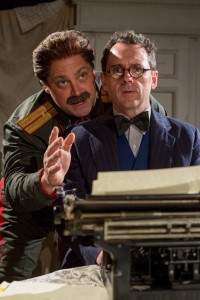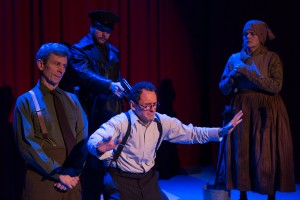Have you ever had dreamed of meeting a person of great importance? Did your dream become a reality? Perhaps that person changed your life. That is exactly what happens to acclaimed Russian playwright Mikhail Bulgakov in John Hodge’s Collaborators. Bulgakov’s dreams, well in his case, nightmares come true in this black comedy set in 1938 in Moscow, Russia. We enter into the world of Bulgakov. It is rumored that Joseph Stalin went to see Bulgakov's play, The White Guard, 15 times (In actual history, it was the play The Day of the Turbins based on the novel The White Guard, and it is said that Stalin saw it over 30 times). Although the run of his current play, The Life of Monsieur de Molière, is successful, Bulgakov is living in dire straits. He lives in a shared apartment provided by the housing committee with his wife Yelena. There is no heat, nor water, scarcely any food to be found, and his body is plagued with disease.
To top it all, Bulgakov is confronted by the NKVD (secret Soviet military police). They tell Bulgakov that he is to write a play about Stalin to be performed at his 60th birthday celebration. When he says "no," they tell him that The Life of Monsieur de Molière will be shut down. He will write the show about Stalin or parish in “the rooms." Reluctant and fearful Bulgakov sits in front of his typewriter desperate for the words to start flowing. A mysterious voice on the phone tells Bulgakov that he can help him. Bulgakov then enters the tunnels under Moscow to meet this mystery person in a secret room under the Kremlin. Who does this haunting voice belong to? It turns out to be Joseph Stalin himself. The men become frenemies and the rest of the play focuses on the wildly twisted relationship between Bulgakov and Stalin.
John Hodge’s play is a witty seriocomic political satire that tickles your funny bone and sends shivers down your spine at the same time. His comedy is the type to slap you in the face and leave a sting. He takes truthful facts and spins them into lines that will have you laughing in 10 seconds flat. For example, the way the character of the first doctor acknowledges knowing Bulgakov with the line “smack head doc turned smut-scribe” is brilliant.
The Grand Hall at St. Mary’s Church, a prewar industry-style brick laid basement in New York City, is the perfect setting for this show. It defiantly enhances the environment of the play, in tandem with a first-rate design team including the set, costumes, lighting and sound. Rebecca Grazi (scenic designer) has created a separate two-stage design that shows the apartment of Bulgakov on one side and what represents parts of Russia on the other side. The center piece of her design is a cupboard even Mother Hubbard would be intrigued by. Her use of color demonstrates the differences between poverty and power. Light dull white, beige and brown hues for Bulgakov’s apartment set in contrast to a striking blood red set of curtains and painted pipes to represent Russia and the Soviet Union. The design may have been more functional in a raised or raked setting. The site lines from the left side of the audience were severely obscured during the scenes that took place in front of the red curtains.
Peter Dobbins' direction is meaningful and done with purpose. Each character is perfectly cast. Robin Haynes does an exceptional job in his portrayal of Vladimir, the power hungry NKVD policeman with self-confidence issues and a desire to rise above his station in life. Haynes’ snarky tone and mocking air is fantastic. Erin Bernard does a lovely job in her role of Yelena as well. She is truly believable as the loving, concerned wife of Bulgakov.
However, this production will be best remembered for its strong casting of the collaborators. Brian J. Carter as the harassed, anxiety-ridden, sickly Bulgakov and Ross DeGraw as a Stalin who delights in playing cat-and-mouse games. Carter’s physical embodiment of Bulgakov is spot on; he is so detailed in the physical that his jaw even trembles when he finds himself trapped by his tormentor’s devious wiles. Ross Degraw is even more impressive in his role as Stalin. He is pleasant and jovial; a man who seems honest and open about his life, seen in his line, “The man who is trapped but his soul is free.” There are even moments of unctuous flattery and warmth from this characterization of Stalin. That is until his eyes suddenly grow black and you see the cold calculating monster that lurks beneath the façade.
If you're a fan of political satire, you will defiantly love this show. Although, if you have very little interest in politics and can’t remember what you learned about Stalin in your 8th grade history books, a recommended brief brush up on the actual history of Stalin’s reign and the life of Bulgakov is advised before coming to this show. You will for sure have a better understanding of who these characters are and why this show is so hilarious.
The Storm Theatre Company’s presentation of Collaborators runs through Feb. 13 at Grand Hall in St. Mary's Church (440 Grand St. between Pitt and Clinton Sts.). Evening performances are Thursday-Saturday at 7:30 p.m. with Saturday matinees at 2 p.m. Tickets are $25 and can be purchased by calling 212-868-4444 or visiting SmartTix.com.








